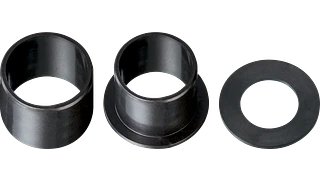Change Language :
iglidur® X - Material data
The most important specifications at a glance
| Descriptive technical specifications | ||
|---|---|---|
| Wear resistance at -100°C | - 🟧 🟧 🟧 🟧 🟧 + | More information on wear resistance |
| Wear resistance at +250°C | - 🟧 🟧 🟧 🟧 🟧 + | |
| Wear resistance at + 315°C | - 🟧 🟧 🟧 ⬜️ ⬜️ + | |
| Surface pressure | - 🟧 🟧 🟧 🟧 🟧 + | 150MPa |
| Low coefficient of friction | - 🟧 🟧 🟧 ⬜️ ⬜️ + | Coefficients of friction µ, dry: 0.09 - 0.27 |
| Wear | - 🟧 🟧 🟧 🟧 ⬜️ + | µm/km, 6.30 |
| Suitable for extremely high speeds | - 🟧 🟧 🟧 🟧 ⬜️ + | |
| Low moisture absorption | - 🟧 🟧 🟧 🟧 ⬜️ + | More information on moisture absorption |
| Excellent wear resistance under water | - 🟧 🟧 🟧 🟧 ⬜️ + | Coefficient of friction µ: 0.04 |
| Very high media resistance | - 🟧 🟧 🟧 🟧 ⬜️ + | More information on media resistance |
| Electrically dissipative | - 🟧 🟧 🟧 🟧 ⬜️ + | |
| Universal chemical resistance | - 🟧 🟧 🟧 🟧 ⬜️ + | |
| Mould resistance | - 🟧 🟧 🟧 🟧 🟧 + | According to DIN EN ISO 846 |
Mechanical specifications
The compressive strength of iglidur X plain bearings decreases with increasing temperatures. Diagram 02 illustrates this relationship. At the long-term permissible application temperature of +250°C, the permissible surface pressure is approximately 30MPa. The maximum recommended surface pressure represents a mechanical material parameter. No conclusions can be drawn about the tribology. With a maximum recommended surface pressure of 35MPa, iglidur X plain bearings are not suitable for extreme loads. Diagram 03 shows the elastic deformation of iglidur X under radial loads.
Permissible surface speeds
iglidur® X is designed for higher speeds than other iglidur® bearings. This is made possible by its high temperature resistance and particularly high thermal conductivity. This is also evident from the pv values of max. 1.32MPa · m/s. At the same time, only minimal radial forces act on the bearing in this case. At the specified speeds, friction can lead to an increase up to the limit of the continuously permissible temperature.
Maximum surface speed
| m/s | Rotating | Oscillating | linear |
|---|---|---|---|
| permanent | 1.5 | 1.1 | 5 |
| Short-term | 3.5 | 2.5 | 10 |
Friction and wear
Like the wear resistance, the coefficient of friction μ also changes with the load (diagram 04 and 05).
Coefficient of friction for iglidur® X against steel (Ra = 1μm, 50HRC):
| iglidur® X | dry | Greases | Oil | Water |
|---|---|---|---|---|
| Coefficient of friction µ | 0.09-0.27 | 0.09 | 0.04 | 0.04 |
Shaft materials
Friction and wear are also highly dependent on the mating partner. Shafts that are too smooth increase the coefficient of friction of the bearing. Smoothed surfaces with an average surface finish Ra of 0.6 to 0.8μm are ideal.
Diagrams 06 and 07 show an extension of the results of tests with different shaft materials that were carried out with iglidur® X plain bearings. If the shaft material you intend to use is not included in the test results presented here, please contact us.
Installation tolerances
iglidur® X plain bearings are standard bearings for shafts with h-tolerance (recommended at least h9). The bearings are designed for the press-fit in a housing with h7 tolerance. After installation in a housing with nominal dimensions, the inner diameter of the bearing with F10 tolerance adjusts itself automatically. For certain dimensions, the tolerance deviates depending on the wall thickness (see product range).
Important tolerances according to ISO 3547-1 after the press-fit:
| Diameter d1 [mm] | Shaft h9 [mm] | iglidur® X F10 [mm] | Housing H7 [mm] |
|---|---|---|---|
| up to 3 | 0 - 0.025 | +0.006 +0.046 | 0 +0.010 |
| > 3 up to 6 | 0 - 0.030 | +0.010 +0.058 | 0 +0.012 |
| > 6 up to 10 | 0 - 0.036 | +0.013 +0.071 | 0 +0.015 |
| > 10 up to 18 | 0 - 0.043 | +0.016 +0.086 | 0 +0.018 |
| > 18 up to 30 | 0 - 0.052 | +0.020 +0.104 | 0 +0.021 |
| > 30 up to 50 | 0 - 0.062 | +0.025 +0.125 | 0 +0.025 |
| >50 to 80 | 0 - 0.074 | +0.030 +0.150 | 0 +0.030 |
Chemical resistance
iglidur® X plain bearings are almost universally resistant to chemicals. As a rule, they are only attacked by concentrated acids.
| Medium | Resistance |
|---|---|
| Alcohols | + |
| Hydrocarbons | + |
| Greases, oils without additives | + |
| Fuels | + |
| Diluted acids | + |
| Strong acids | - |
| Diluted alkalines | + |
| Strong alkalines | + |

Buy iglidur X products in the online shop
- Large selection of moulds and materials
- Available within 24 hours
- No minimum order value
- No minimum order quantity
Typical application areas
ASI Automatikk AS Distributor+47 9006 1100









